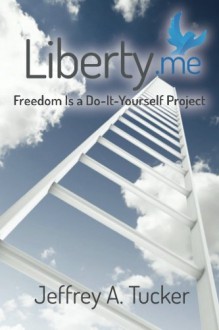History is shifting in radical ways. Government programs are failing to meet modern needs. Material progress around the world is proceeding without them. The twentieth century, full of central planning and leviathan control, is being left behind, and a new age is dawning. It is a time of...
show more
History is shifting in radical ways. Government programs are failing to meet modern needs. Material progress around the world is proceeding without them. The twentieth century, full of central planning and leviathan control, is being left behind, and a new age is dawning. It is a time of individual empowerment, astonishing entrepreneurial achievement, global communications and engagement, and a breathtaking pursuit of new possibilities. Liberty.me: Freedom Is a Do-It-Yourself Project documents how this is happening now and presents an agenda for liberty-minded individuals to push this further. Consider that most of the technologies that define our lives today — smartphones, email, Internet banking, infinite television and radio, instant knowability of nearly everything, global real-time video communication — didn't even exist just twenty years ago. They weren't even imagined. They are blessings bestowed on us through the combined forces of entrepreneurship, risk taking, enterprising initiative, crowd-sourced cooperation, and the disruptive impulse that seeks to make the world anew. And yet they are far more integral to life than any institution created by politics. This is humanity speaking and acting, one person at a time. All over the world, people are protesting against their rulers in whatever way is possible. This represents a paradigm shift away from despotism and toward the assertion of individual rights to control our own property and self, forming social and economic associations for ourselves. With state systems failing in every direction, this is the trajectory of history in a world of global communication and trade. Breaking through the regimentation of the barriers all around us requires political action and intellectual work, to be sure, but it must not stop there. In fact, these might be the least effective paths toward real change. Building a new liberty requires taking the bold step of actually innovating tools to live freer lives. It means creating and embracing new technologies, modes of communication, educational strategies, life paths, and leveraging the new technologies to build bridges out of the status quo and into a better future. This is an essential stage of any giant social change — the stage in which we stop asking leaders to grant us liberty in law but rather take the step of acting on the liberty that is our right. For too long, people have looked at liberty as something controlled by powerful people to make or take away. We are learning that the future of liberty is something that falls to the hands of those who believe most passionately in it. This is the source of all progress in our time. There are many muses behind this project and this book. Ludwig von Mises provides the economics, Murray Rothbard the ethical drive, Ayn Rand the motive force, Albert Jay Nock the conviction that life works without government, Garet Garrett the eye for the drama of the marketplace, F.A. Hayek the vision of a self-ordering social order, Leonard Read the perception that individuals can create their own liberty, Rose Wilder Lane the intransigent resistance to all forms of authoritarianism, plus a thousand other leading intellectual lights who have prepared the way for a new generation to make real what others could only dream about. The time is now to take the idea of human liberty seriously, not only as a political agenda but a life commitment, a value that drives personal ambitions. This is the essential way to make the structures of oppression that have consumed the social order decay as anachronisms and eventually become irrelevant and obsolete. This happens when the institutions we have created serve society more effectively than the decaying apparatus of coercion and compulsion ever did or can do in the future. The state will not go away — as much as we might like it to — but it can become ever less determinative of our fate.
show less

